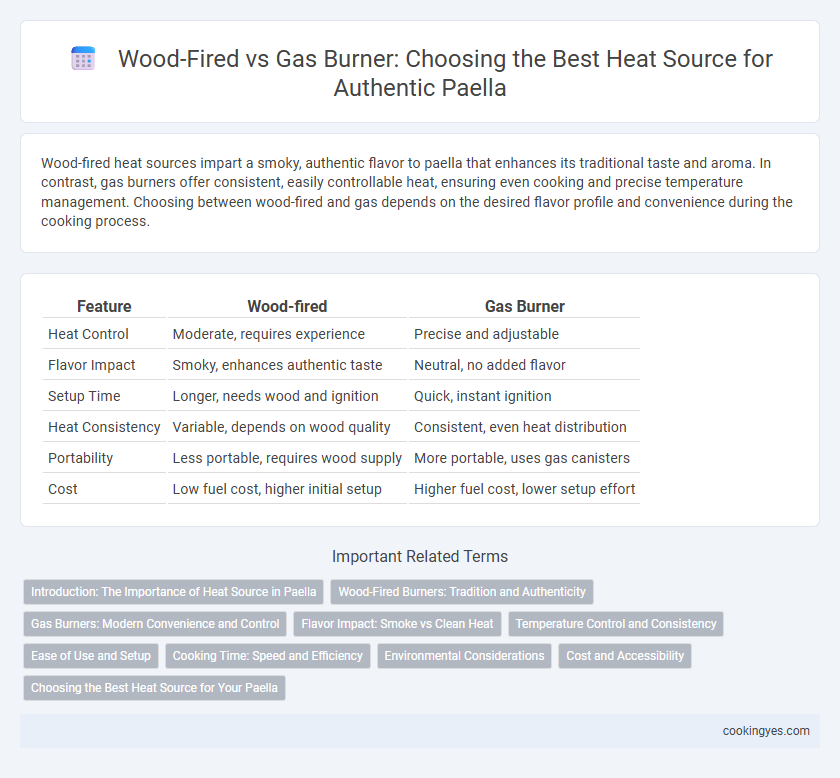Wood-fired heat sources impart a smoky, authentic flavor to paella that enhances its traditional taste and aroma. In contrast, gas burners offer consistent, easily controllable heat, ensuring even cooking and precise temperature management. Choosing between wood-fired and gas depends on the desired flavor profile and convenience during the cooking process.
Table of Comparison
| Feature | Wood-fired | Gas Burner |
|---|---|---|
| Heat Control | Moderate, requires experience | Precise and adjustable |
| Flavor Impact | Smoky, enhances authentic taste | Neutral, no added flavor |
| Setup Time | Longer, needs wood and ignition | Quick, instant ignition |
| Heat Consistency | Variable, depends on wood quality | Consistent, even heat distribution |
| Portability | Less portable, requires wood supply | More portable, uses gas canisters |
| Cost | Low fuel cost, higher initial setup | Higher fuel cost, lower setup effort |
Introduction: The Importance of Heat Source in Paella
The heat source plays a crucial role in authentic paella preparation, directly influencing cooking consistency and flavor development. Wood-fired burners impart a smoky aroma and high, uneven heat essential for creating the prized socarrat--the crispy rice crust--while gas burners offer precise temperature control and convenience. Selecting the appropriate heat source balances tradition with practicality, impacting both the texture and sensory experience of the dish.
Wood-Fired Burners: Tradition and Authenticity
Wood-fired burners provide an authentic, traditional heat source for cooking paella, delivering intense, even heat that infuses the dish with a smoky flavor unique to classic Spanish recipes. The natural wood smoke enhances the saffron-infused rice and seafood, creating a depth of flavor difficult to replicate with gas burners. This method preserves the cultural heritage of paella, making it the preferred choice for purists seeking genuine Spanish culinary experiences.
Gas Burners: Modern Convenience and Control
Gas burners for paella cooking offer precise temperature control, enabling consistent heat distribution essential for achieving the perfect socarrat. Their modern convenience allows for quick ignition and adjustable flame levels, making them ideal for both novice cooks and professional chefs. Unlike wood-fired heat, gas burners provide a cleaner, more efficient, and environmentally friendly cooking experience.
Flavor Impact: Smoke vs Clean Heat
Wood-fired paella pans infuse the dish with a distinctive smoky aroma and rich, complex flavors that enhance the traditional Spanish experience. Gas burners provide clean, consistent heat that allows precise temperature control, preserving the natural taste of saffron, seafood, and rice without additional smoky notes. Choosing between wood-fired and gas heat sources affects the final flavor profile, with wood fire adding depth through smoke and gas ensuring pure, unaltered ingredient flavors.
Temperature Control and Consistency
Wood-fired heat sources for paella offer high heat intensity and impart a smoky flavor but can be challenging to control precisely, leading to uneven temperature distribution. Gas burners provide consistent and easily adjustable heat, allowing precise temperature control that ensures even cooking and minimizes the risk of burning. For optimal paella results, gas burners are favored for temperature stability, while wood-fired methods appeal to those seeking traditional smoky nuances.
Ease of Use and Setup
Wood-fired paella burners offer authentic smoky flavor but require more effort in controlling temperature and managing firewood, making setup and heat regulation more complex. Gas burners provide consistent, easily adjustable heat with straightforward ignition and minimal preparation, ideal for quick and precise cooking. For ease of use and setup, gas burners are preferred by most home cooks and professionals seeking efficiency and reliable temperature control.
Cooking Time: Speed and Efficiency
Wood-fired paella cookers offer intense, uneven heat that enhances flavor but often require longer cooking times due to temperature management challenges. Gas burners provide consistent, adjustable heat, enabling faster and more efficient cooking with precise control over the paella's simmering process. Choosing gas burners typically reduces overall cooking time while maintaining even heat distribution for optimal texture and doneness.
Environmental Considerations
Wood-fired paella burners emit higher levels of carbon dioxide and particulate matter, contributing to air pollution and deforestation concerns, while gas burners produce fewer emissions and offer a cleaner, more controlled heat source. Gas burners also reduce the risk of smoke inhalation and ash contamination during cooking, promoting a healthier cooking environment. The choice of heat source impacts sustainability, with gas burners generally considered more environmentally friendly due to lower greenhouse gas emissions and improved fuel efficiency.
Cost and Accessibility
Wood-fired paella cookers often require more initial investment due to the need for quality firewood and specialized equipment, but wood is generally inexpensive and accessible in rural areas. Gas burners offer a more consistent heat source with easier temperature control, and propane or natural gas is widely available in urban settings, although fuel costs may be higher than wood. Choosing between wood-fired and gas burners depends on balancing cost-effectiveness with fuel accessibility specific to the cooking environment.
Choosing the Best Heat Source for Your Paella
Wood-fired heat sources impart a smoky, authentic flavor to paella, enhancing traditional taste profiles with natural wood aromas and uneven heat distribution that creates crispy socarrat. Gas burners offer precise temperature control and consistent heat, making it easier to manage cooking times and avoid burning the rice. Choosing between wood-fired and gas burners depends on prioritizing authentic flavor and rustic cooking experience versus convenience and accuracy in heat management.
Wood-fired vs Gas burner for Paella heat source Infographic

 cookingyes.com
cookingyes.com